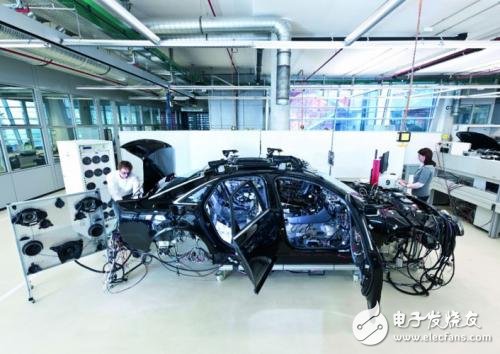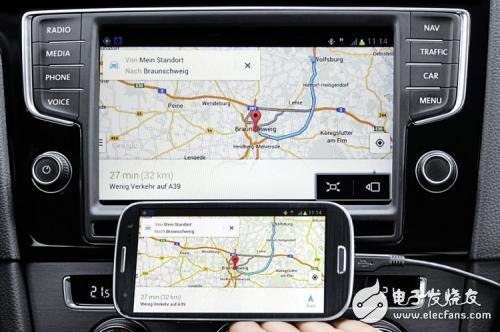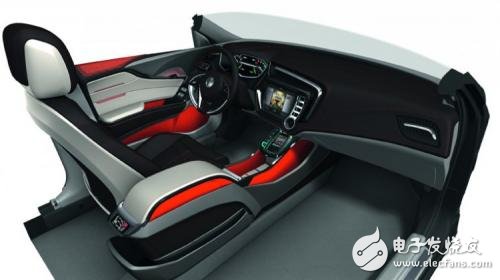When the car hits the Internet, it means that the concept of "big data" also flows to the traditional automotive industry. Suppliers such as OEMs, parts and aftermarkets are developing more advanced driver assistance and in-vehicle entertainment systems. The car seems to have become the god of the river in Hayao Miyazaki’s "Spirited Away", invisible Engulfed a large number of users' information and data. Therefore, the management of the flow and use of car users is becoming more and more important.
On the one hand, from the perspective of security, drivers are easily scored by too much information; from another dimension, the more information data the car receives, the more intricate and complex the in-vehicle electronics and electrification equipment will become. Just as the mother loves to indulge her own children, in the past fifteen years, the uncontrolled development of the automotive industry has caused excessive bloat of the current in-vehicle system, but now the cumbersome and in-vehicle equipment has become a nail in the eyes of the manufacturers, and it is uncomfortable. , unplugged and distressed.
Advanced bandwidth: 1Gbit/s plastic fiber, 5Gbit/s coaxial cable, 10Gbit/s fiberglass fiber
In the face of these challenges, engineers still have a lot of brushes in their hands:
First, it is completely possible to replace the existing unshielded twisted pair cable with a fiber medium that can transmit network data at high speed;
Secondly, in terms of computing functions, multi-core processors can not only assign different tasks to specific single-core processors, but also upload some functions to the cloud or rely on mobile devices like smartphones.
Although limousines with multi-screen entertainment systems use a large number of computer processors for their rich and varied functions, the advantages of multi-core technology are the reduction of data nodes in the automotive network, which means less control and design of the car. Complexity. In addition, multi-core technology can also solve the problem of increasing computing power requirements of computer chips as the number of ADAS increases.
For example, each single core of a quad-core processor can control entertainment systems, cloud services, driver information, and ADAS, respectively. At the same time, different processor cores are configured for different operating system bottom layers (Android, iOS and Linux).
But as the number of ADAS systems increases, it will become increasingly difficult to scale down the physical network. In-vehicle entertainment systems, because the built-in sensors cannot be integrated, all the basic equipment is greatly affected by these sensors scattered around. For example, the rear view camera can only be installed somewhere in the rear compartment of the car, and the forward looking radar can only be placed in front of the car.

Use fiberglass fiber to increase data transfer rate and reduce equipment complexity
The maximum transmission rate of plastic optical fiber can reach 1Gbit/s, while that of coaxial cable is 5Gbit/s. However, as the data transmission rate increases, the system becomes complicated and the cost continues to rise. The application of future fiberglass cables will address the paradox of speed and cost. However, in addition to fiberglass cables, Ethernet, which is widely used in communications equipment, personal computers and home appliances, will dominate the in-vehicle LAN. In addition to its own openness, interconnection and other advantages, after importing it into the automotive environment, in addition to the original in-vehicle equipment, linkage with a variety of devices such as smartphones and tablets will become easier.
After using fiberglass fiber optic cable as the transmission medium, the network bandwidth can be increased to 10 Gbit/s, and the system needs to transmit the same amount of data with fewer cables, but it does not affect the durability of the network. The construction of the car Ethernet mentioned above is in line with the requirements of high-speed data transmission in the future; on the other hand, Ethernet can also serve to streamline the network and reduce costs.
Smart terminal: give the car access to the "outside brain"
Of course, the load on the embedded system can also be mitigated by using the handheld device to provide the computing power required. At the same time, this approach can also make the entertainment system in low-end cars less costly, and avoid the surplus of equipment caused by over-exploitation of consumer electronics.

Smart device as an external processor: reducing the load on the car entertainment system processor
Whenever a new smartphone goes on the market, it uses the latest chip technology, not only with multi-core processors, but also adds more memory. But for the car, it is impossible to achieve the same speed of replacement as consumer electronics. In addition, subject to the cost of technology, the automotive industry cannot rely too much on twinning technology, even in order to adapt to future performance demands.
For this problem, the initial idea of ​​the component supplier Johnson Controls is to integrate the tuner, signal amplifier and network connection device (such as Wi-Fi) into a system, and then install it on the smart devices currently on the market. In this way, complex electronic devices on some small cars can be replaced by this re-integrated smart device. Harald Schöpp, director of engineering at Johnson Controls In-vehicle Entertainment Systems, said: "Our goal is to make these smart gadgets in your pocket an extension of the functionality of the in-vehicle system."
Therefore, the use of mobile devices as an aid to additional computing power will help these classic cars to be less obsolete and the coordination of in-vehicle systems will be better. Future mobile app apps can bridge the gap between fast-growing consumer electronics and automotive hardware. But for those luxury limousines that are not bad, the fully built-in in-car entertainment system is still preserved because the cost is not a major issue for them.
Cloud computing, air "buildings"
In the future, the in-vehicle system presents a trend of high development, especially in the case that the speech recognition function becomes more intelligent and the information processing algorithm is more complicated, the cloud computing technology can effectively reduce the burden of the embedded system.

Streamline system devices after transferring functionality to the cloud
Moving the system to the cloud can greatly improve the quality of operation and the rate of recognition. When the language commands you send are accepted by the receivers in English, German, French, and Spanish with cloud technology, they can process all the data in parallel and then output them synchronously.
However, more advanced cloud technologies require high-speed network connections like 4G or Wi-Fi. However, in some areas, stable 3G and even GSM communication technologies are problems, so there is still a long way to go to achieve highly developed cloud technologies.
At present, the screen of the in-vehicle system seems to be getting bigger and less, whether it is a streaming media content such as a DVD for passengers to watch, or a 3D navigation data for the driver, in the process of video encoding/decoding, an in-vehicle system is required. Have enough processing power. But don't forget that in addition to vision, the driver has hearing and touch. Now the lane departure warning system will shake the steering wheel, which is the result of tactile research. In the future, you should focus on developing more in-vehicle technologies that can mobilize the driver's sense of body.
Ei 96 Transformer,96 Va Transformer,Ac Current Transformer,Ei Transformer
Guang Er Zhong(Zhaoqing)Electronics Co., Ltd , https://www.poweradapter.com.cn